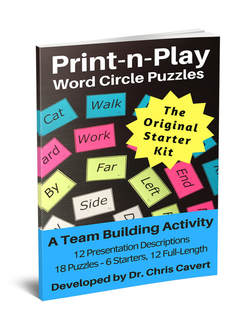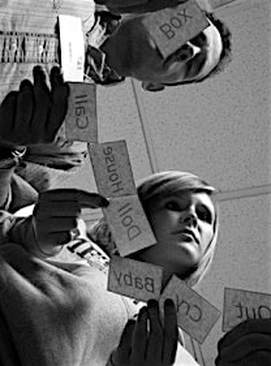|
How It Works
The basic idea of Word Circle Puzzles is to take a given set of single words and create a circle formation of words, matching each single word with another to form common, and in some cases, not-so-common phrases, words, names and other arrangements. In many cases, these two-word combinations are considered, by definition, idioms. According to The American Heritage Dictionary of Idioms (2003), an idiom “is a set phrase of two or more words that means something different from the literal meaning of the individual words” (p. iii). For example, common two-word phrases (or idioms) might be “Board Game” or “Finger Food.” Common words formed with two single words might be “infuse” or “weekend”. Additional examples of card-to-card arrangements include:
|
|
Programmable Outcomes
The Word Circle Puzzles found in this kit have a wide range of possible outcomes appropriate for groups ages 15 and older (however, don’t let this stop you from using the puzzles with younger groups). First and foremost, for me, they are just darn fun to solve. They are also great fun (and sometimes challenging) to create. As a community building or team building tool, I have been able to facilitate discussions (debriefing or processing sessions) around the following ideas or concepts: |
Roles Within a Group - What roles did players take during the activity? What roles were missing? What responsibilities were a part of each role taken in the group?
Forms of Communication - In what ways did the group communicate during the activity? How were these ways helpful or un-helpful?
Levels of Understanding (about the activity and how it changed over time) - What is understanding and misunderstanding and what are the affects within a group?
Flexibility - After making a word combination are players willing to split up the combination (“walk away” from a connection) in order to try another connection?
Energy Level During the Activity - What are the ‘ebbs’ and ‘flows’ of the activity over time? What contributes to these fluctuations?
Frustration - What levels of frustration occurred and what did players do about it?
Finding One’s Place - When someone found his/her “spot” (or thought they found it) what was the activity like for them? What did they think about and/or what did they do?
Helping - How much “help” did players need? What kinds of help showed up during the activity? Did anyone ask for help? Who was asked? Who was available to offer help? What are some reason we have for not asking for help? What possible consequences are there when people ask for too much help?
Success and Failure - Was the group successful? How was your success measured? Are there any other ways to measure success? What’s the difference between “product” success and “process” success? Did the group fail at any point during the activity? What failures did you recognize? Looking back, what failures went unrecognized? How did the group and/or individuals react to failure during or after the activity? How did these reactions affect the group?
Progression - What would it be like to try the hardest puzzle first and an easy puzzle last? How does the idea of “progression” fit into the lives or the participants? How do we approach something that is new? When we get “stuck” doing something new, what choices do we face?
Alternative Solutions or Ways to Approach a Challenge - How were ideas shared within the group? Did the group explore/try more than one way to approach the challenge? Is it possible to have more than one answer to a challenge? Always?
Time Constraints – How did “time” play out in the activity? Was time related to any experiences of stress? How was the time stress managed? How does time playout in our lives? How do we manage time stressors?
Consensus - Does/did everyone agree with specific word combinations? How did you know? Did everyone agree with the answer before asking for the “right” answer? How did you know everyone was in agreement?
Forms of Communication - In what ways did the group communicate during the activity? How were these ways helpful or un-helpful?
Levels of Understanding (about the activity and how it changed over time) - What is understanding and misunderstanding and what are the affects within a group?
Flexibility - After making a word combination are players willing to split up the combination (“walk away” from a connection) in order to try another connection?
Energy Level During the Activity - What are the ‘ebbs’ and ‘flows’ of the activity over time? What contributes to these fluctuations?
Frustration - What levels of frustration occurred and what did players do about it?
Finding One’s Place - When someone found his/her “spot” (or thought they found it) what was the activity like for them? What did they think about and/or what did they do?
Helping - How much “help” did players need? What kinds of help showed up during the activity? Did anyone ask for help? Who was asked? Who was available to offer help? What are some reason we have for not asking for help? What possible consequences are there when people ask for too much help?
Success and Failure - Was the group successful? How was your success measured? Are there any other ways to measure success? What’s the difference between “product” success and “process” success? Did the group fail at any point during the activity? What failures did you recognize? Looking back, what failures went unrecognized? How did the group and/or individuals react to failure during or after the activity? How did these reactions affect the group?
Progression - What would it be like to try the hardest puzzle first and an easy puzzle last? How does the idea of “progression” fit into the lives or the participants? How do we approach something that is new? When we get “stuck” doing something new, what choices do we face?
Alternative Solutions or Ways to Approach a Challenge - How were ideas shared within the group? Did the group explore/try more than one way to approach the challenge? Is it possible to have more than one answer to a challenge? Always?
Time Constraints – How did “time” play out in the activity? Was time related to any experiences of stress? How was the time stress managed? How does time playout in our lives? How do we manage time stressors?
Consensus - Does/did everyone agree with specific word combinations? How did you know? Did everyone agree with the answer before asking for the “right” answer? How did you know everyone was in agreement?



